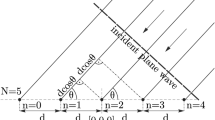Abstract
This paper presents a performance analysis of a recently proposed preamble-based reduced-complexity (RC) two-stage synchronization technique. The preamble, composed of two identical subsequences, is first used to determine an uncertainty interval based on Cox and Schmidl algorithm. Then, a differential correlation-based metric is carried using a new sequence obtained by element wise multiplication of the preamble subsequence and a shifted version of it. This second step is performed to fine tune the coarse time estimate, by carrying the differential correlation-based metric over the uncertainty interval of limited width around the coarse estimate, thus leading to low computational load. In this paper, we first discuss some complexity issues of the RC approach compared to previously proposed algorithms. Then, we study the effect of the training sequence class and length choices on the synchronization performance in the case of multipath channels. The impact of the uncertainty interval width on the trade-off between performance and complexity is also studied. The two-stage approach was found to provide almost equal performance to those obtained by the most efficient differential correlation-based benchmarks. However, it has a very reduced computational load, equivalent to that of sliding correlation-based approaches.






Similar content being viewed by others
References
Prasad R (2004) OFDM for wireless communications systems. Artech House, Norwood
Ozbek B, Le Ruyet D, Khanfir H (2008) Performance evaluation of multicast MISO-OFDM systems. Ann Telecommun 63(5–6):295–305
Schmidl TM, Cox D (1997) Robust frequency and timing synchronization in OFDM. IEEE Trans Comm 45:1613–1621
Minn H, Tarasak P, Bhargava VK (2000) On timing offset estimation for OFDM systems. IEEE Comm Lett 4(7):242–244
Minn H, Bhargava VK, Letaief KB (2003) A novel timing estimation method for OFDM systems. IEEE Trans Comm 2(4):822–839
Nasir AA, Durrani S, Kennedy RA (2010) Performance of coarse and fine timing synchronization in OFDM receivers. ICFCC 2:412–416
Nasraoui L, Najjar Atallah L, Siala M (2010) An efficient synchronization method for OFDM systems in multipath channels. In: Proc ICECS, pp 1152–1155
Awoseyila AB, Kasparis C, Evans BG (2009) Robust time-domain timing and frequency synchronization for OFDM systems. IEEE Trans Consum Electron 55:391–399
Yang Y, Qing H, Zaichen Z (2009) An efficient joint timing and frequency offset estimation for OFDM systems. In: Proc. VTC Spring, pp 1–5
Chou C-P, Lin W-J, Lin J-S (2009) Timing synchronization with insertion of zero-padding preambles for OFDM systems. In: ICICS: International conference on information, communications and signal processing, pp 1–5
Nasraoui L, Najjar Atallah L, Siala M (2012) An efficient reduced-complexity two-stage differential sliding correlation approach for OFDM synchronization in the multipath channel. In: Proc. WCNC, pp 2059–2063
Nasraoui L, Najjar Atallah L, Siala M (2012) Performance study of a reduced complexity time synchronization approach for OFDM systems. In: Proc. ComNet, pp 1–5
Rodrigues R, Dinis R, Cercas F (2012) Training sequence design for channel estimation with nonlinear OQPSK-type modulations. In: IEEE VTC Fall, pp 1–5
Hiratsuka K, Kondo K, Nakagawa K (2008) On the accuracy of estimated synchronization positions for audio digital watermarks using the modified patchwork algorithm on analog channels. In: International conference on intelligent information hiding and multimedia signal processing, pp 628–631
Turkmani AMD, Goni US (1993) Performance evaluation of maximal-length, gold and Kasami codes as spreading sequences in CDMA systems. Int Conf Univ Pers Commun 2:970–974
Zhang PY, Wu J, Wang J (2010) Fast correlation for gold large sets of Kasami sequences. In: IEEE VTC Spring, pp 1–5
Golomb S (1967) Shift register sequences. Holden-Day, San Francisco
Mitra A (2008) On the construction of m-sequence via primitive polynomials with a fast identification method. Int J Comput Electr Eng 3(3):158–163
Rice M, Tretter S, Mathys P (2001) On differentially encoded m-sequences. IEEE Trans Comm Lett 49(3):421–424
Gold R (1968) Maximal recursive sequences with 3-valued recursive cross-correlation functions. IEEE Trans Inform Theory 14:154–156
Kasami T (1966) Weight distribution formula for some class of cyclic codes. Coordinated Sci. Lab., Univ. Illinois, Urbana, IL, Tech. Rep. R-285 (AD632574)
Author information
Authors and Affiliations
Corresponding author
Additional information
This paper is an extended version of the conference paper [12] that appeared in the Proceedings of ComNet 2012.
Rights and permissions
About this article
Cite this article
Nasraoui, L., Najjar Atallah, L. & Siala, M. Performance evaluation of an efficient reduced-complexity time synchronization approach for OFDM systems. Ann. Telecommun. 69, 321–330 (2014). https://doi.org/10.1007/s12243-013-0368-5
Received:
Accepted:
Published:
Issue Date:
DOI: https://doi.org/10.1007/s12243-013-0368-5




